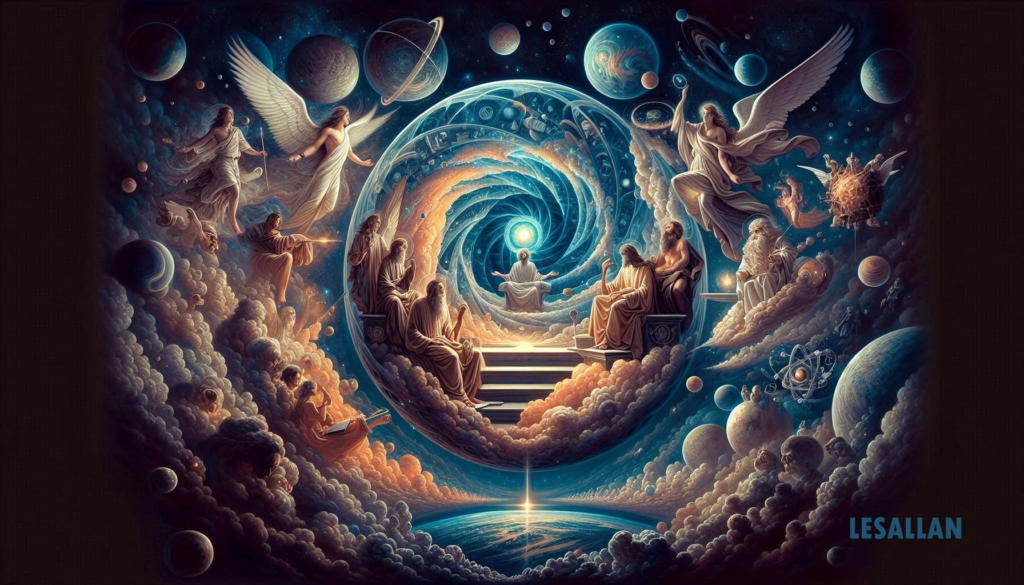Lesallan | April 17, 2025

Existence and Nature of God: A Metaphysical Inquiry
The discourse surrounding the existence of God and the nature of divine attributes, such as omnipotence and omniscience, has consistently served as a foundational element in metaphysical exploration. Philosophers and theologians have historically engaged with a variety of logical frameworks, prominently featuring the ontological argument alongside modal arguments that investigate the implications of “possible worlds” (Nash, 1999, pp. 220–225). This paper critically assesses the logical cohesion of traditional arguments for theism and examines the assertions of God’s omnipotence and omniscience. While it addresses the challenges and paradoxes that arise through logical analysis, it also posits that faith’s metaphysical and experiential dimensions further substantiate the notion of a perfect, eternal being.
Arguments for God’s Existence
Nash (1999) delves into various classical arguments supporting the existence of God, with particular emphasis on Anselm’s ontological argument and its adaptations through worlds semantics. Anselm posits that if God is defined as “that than which nothing greater can be conceived,” it logically follows that God must exist; this stems from the notion that perfection inherently necessitates existence. While this argument exhibits a certain intellectual elegance through its self-referential framework, it has faced significant criticism, most notably from Immanuel Kant. Kant contends that existence is not a predicate that enhances an entity’s concept (Nash, 1999, pp. 172–177). In scrutinizing these arguments’ coherence, it is crucial to differentiate between conceptual necessity and empirical evidence. The ontological argument is logically consistent within the confines of its definitions; however, critics argue that the transition from conceptual analysis to existential affirmation relies on assumptions that lack empirical verification.
In his 1974 work, Plantinga (1974) refines modal arguments concerning divine existence by utilizing world semantics. He posits that if the existence of a maximally great being is possible, then such a being exists in at least one world, and by extension, in all worlds. Here, “possible worlds” refers to logically coherent hypothetical scenarios that could exist. Despite the systematic rigor of this framework, it raises ontological questions about the interpretation of “possible worlds” and whether modal logic sufficiently encapsulates the complexity of reality. Although these conceptual arguments for God’s existence have a strong logical foundation, they are inherently subject to varying interpretations and are enhanced when reinforced by personal, experiential, and spiritual evidence (Plantinga, 1974).
Theologically, the concept of God’s creative power as inherently integrated into the very essence of existence provides a compelling framework for these discussions. For instance, Romans 1:20 (NIV) articulates that “since the creation of the world God’s invisible qualities—his eternal power and divine nature—have been clearly seen, being understood through what has been made” (Romans 1:20, NIV). This verse posits that the natural order acts as a latent witness to the divine, suggesting that logical reasoning and empirical evidence can collectively point to the reality of a transcendent creator. Such a perspective invites an interdisciplinary exploration of how metaphysical implications arising from observations of the natural world can reinforce theological assertions regarding divine existence.
The Nature of Divine Attributes: Omnipotence and Omniscience
The assertions that God is both omnipotent and omniscient are foundational elements of classical theism. The attribute of omnipotence denotes an all-encompassing power, while omniscience refers to exhaustive knowledge. In his 1999 analysis, Nash delves into these attributes through the lens of philosophical dilemmas, notably the “paradox of the stone” for omnipotence and the foreknowledge problem for omniscience (Nash, 1999). The paradox of the stone questions whether an omnipotent deity can create a stone so massive that He cannot lift it. This inquiry challenges the coherence of omnipotence itself. The foreknowledge problem raises significant implications for concepts of free will and determinism, particularly when considering a deity with complete knowledge of future actions.
To address the paradox of omnipotence, it is often suggested that omnipotence does not include the ability to perform logically contradictory actions (Nash, 1999, pp. 172–177). This clarification is crucial for preserving the logical integrity of the concept while acknowledging that human interpretations of power might inadequately represent the intricacies of divine capability. Such discourse fosters a deeper understanding of the philosophical significance of these divine attributes and their implications for theological discourse.
The concept of omniscience inherently raises implications for the doctrine of free will. If divine foreknowledge encompasses all future actions, it implies a restriction on human autonomy. However, advocates of omniscience contend that prior knowledge of an event does not causally determine its occurrence; rather, it represents a static, timeless comprehension that exists beyond the constraints of temporal progression (Plantinga, 1974). This notion finds corroboration within the biblical framework as well. For instance, Proverbs 3:19 (ESV) states, “By wisdom the Lord laid the earth’s foundation, by understanding he set the heavens in place” (Proverbs 3:19, ESV). This passage reinforces the interpretation that divine wisdom—and, by extension, omniscience—is fundamentally intertwined with the structured order that characterizes creation.
Assessing the logical coherence of divine attributes necessitates a careful differentiation between our finite understanding and the infinite essence of the divine. The paradoxes inherent in the concepts of omnipotence and omniscience can be particularly perplexing; however, they often underscore the limitations of human language and the inadequacy of finite constructs in articulating the nature of the infinite. Consequently, it is plausible to assert that the classical definitions of these attributes, when considered rigorously and excluding logical contradictions, are coherent within a paradigm that acknowledges divine transcendence over the bounds of human reality.
Defending the Position: The Complementary Roles of Logic and Faith
The logical examination of theistic arguments and the assessment of divine attributes indicate that while rational discourse can illuminate certain truths about the divine, it may not definitively resolve metaphysical inquiries. As articulated by Nash (1999) and Plantinga (1974), both logical arguments and modal frameworks play significant roles in establishing a coherent, albeit not necessarily irrefutable, basis for belief in God. I contend that the logical architecture of these arguments remains instrumental in shaping our comprehension of divine nature. However, it is crucial to emphasize that faith, in this context, transcends mere acceptance of doctrinal claims; it represents a transformative encounter that deepens our understanding of the divine—an assertion underpinned by biblical narratives and the authentic experiences of believers.
The biblical narrative in Genesis 1:1 (“In the beginning, God created the heavens and the earth”) (Genesis 1:1, ESV) asserts a foundational premise regarding divine creativity, widely accepted by adherents as both an act of faith and a historical claim. Complementarily, passages like Psalm 147:5 (ESV) “Great is our Lord, and abundant in power; his understanding is beyond measure” (Psalm 147:5, ESV) underscore God’s omnipotence and omniscience, fostering both philosophical consensus and existential reverence. When coupled with thorough logical scrutiny, these scriptural foundations not only enhance but also reinforce the conceptual coherence of theism, particularly in relation to the characteristics attributed to an all-powerful and all-knowing entity.
In defending this position, one might argue that critical reasoning enhances faith by providing believers with a structured approach to articulate and defend their convictions. The logical rigor underlying arguments for the existence of God bolsters the proposition that a necessary being—defined by perfection, omnipotence, and omniscience—offers the most coherent explanation for the universe’s order and complexity. As illustrated in Nash (1999) and contemporary philosophical discourse, our intellectual engagements with these attributes illuminate our limited attempts to grapple with an infinite locus of mystery.
Conclusion and Summary
In conclusion, the logical analyses of arguments concerning God’s existence and the assertions of divine omnipotence and omniscience highlight a complex relationship between rational inquiry and revelation. Anselm’s ontological argument, supplemented by modal logic, presents a strong theoretical foundation for positing the existence of a maximally great being; however, it faces substantial critique regarding its foundational definitional assumptions and the inherent limitations of logical discourse. Moreover, when interpreted in a refined logical framework that avoids self-contradictory implications, the classical assertions of divine omnipotence and omniscience exhibit coherence and relevance within both philosophical and scriptural paradigms. While logical arguments may not serve as irrefutable proof of the divine, their synthesis with biblical narratives and personal faith experiences creates a robust epistemic framework that lends credence to the belief in a transcendent, perfect deity.
I hope this analysis critically assesses the logical coherence of the presented arguments while also advocating for integrating philosophical reasoning with scriptural revelations. Future investigations could delve into comparative theological perspectives on divinity across various cultures or conduct a more rigorous examination of modal metaphysics and its ramifications for current theological discussions.
References:
Nash, R. (1999). Life’s ultimate questions. Zondervan.
Plantinga, A. (1974). God, freedom, and evil. E. P. Dutton.



1 Comment
Reese Richard · April 26, 2025 at 10:01 pm
Great Minds Think Differently (Free Newsletter)
➜ newsletter.scottdclary.com
Each week, Scott’s Newsletter breaks down the ideas, strategies, mental models and frameworks that separates the exceptional from the average.
Join 320,000+ entrepreneurs and innovators who use these insights to spot hidden opportunities and make smarter moves.
If you want to level up in your career. If you want to level up in your business. This is a free newsletter that will transform how you think, decide, and compete in today’s complex world.
Subscribe now.
Your future self will thank you.
➜ newsletter.scottdclary.com
Comments are closed.